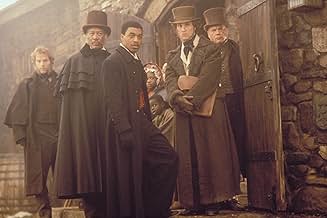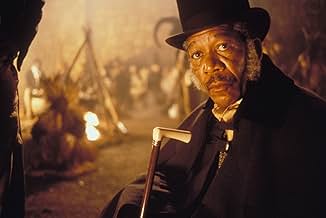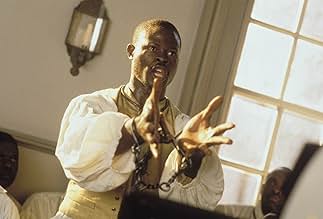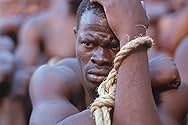Amistad
- 1997
- Tous publics
- 2h 35min
En 1839, la révolte des prisonniers de Mende à bord d'un navire sous pavillon espagnol provoque une controverse importante aux États-Unis. Les tribunaux doivent décider si les Mende sont des... Tout lireEn 1839, la révolte des prisonniers de Mende à bord d'un navire sous pavillon espagnol provoque une controverse importante aux États-Unis. Les tribunaux doivent décider si les Mende sont des esclaves ou des hommes libres.En 1839, la révolte des prisonniers de Mende à bord d'un navire sous pavillon espagnol provoque une controverse importante aux États-Unis. Les tribunaux doivent décider si les Mende sont des esclaves ou des hommes libres.
- Réalisation
- Scénario
- Casting principal
- Nommé pour 4 Oscars
- 11 victoires et 44 nominations au total
- Lieutenant Meade
- (as Darren Burrows)
Avis à la une
That is, in essence, what Steven Spielberg's gripping drama "Amistad" is about. Through its various dramas, Spielberg presents a case about a group of Africans, who, after being seized from their home, were forced onto a ship and sent to the United States aboard "La Amistad". On their way there, the slaves, led by Cinque (Djimon Hounsou), rebelled, killing off part of the crew. However, the ship was still directed towards the United States, where the Africans were brought to trial under murder.
In the court, various factions claim ownership of the slaves, and therefore try to seize them away. The United States government, led by President Martin Van Buren (Nigel Hawthorne), and Secretary of State Secretary Forsyth (David Paymer), try to ship the Africans to Spain, where an 11 year old Isabella II (Anna Paquin) wants them back. The two Spaniards who own "La Amistad" want the slaves for themselves. The American ship that found the slaves also wants them. In the midst of this are two abolitionists (Stellan Skaarsgard and Morgan Freeman), who want the slaves to be free. They enlist the help of lawyer Matthew McConaughey, who tries to free them. Through various legal proceedings, the case appears before the Supreme Court, where it is argued by ex-President John Quincy Adams (Anthony Hopkins).
The film itself is a visual wonder. Spielberg favorite Janusz Kaminski sets the film in a dark, somber mood when appropriate, and a visual setting when appropriate as well. At times, the film is very slow, and very methodical. Spielberg is not at his finest here, the courtroom scenes have a tendency to lag. But Spielberg's finest work in the film, the opening scene, a scene of Cinque's family, and the brutal voyage of the slaves to America, is altogether stunning. It is this emotional force that carries the film. McConaughey is superb as the lawyer defending the Africans, Hopkins is sensational as the old Adams, Freeman is outstanding when used (Spielberg vastly under uses his supreme talents), and the rest of the cast is stellar. The movie, however, belongs to Hounsou. His emotional intensity is brilliant. Spielberg manages to make even the slowest scenes sparkle with focus on Hounsou, and the film's extraordinary power is simply captivating. The film is flawed, for most of the supporting characters are merely cardboard. But that doesn't matter. The story is a gripping one, and one of extreme importance. Kudos to Spielberg for finding it, finding the right men for the job, and letting the audience listen to the words of Cinque. A good job all around. ***1/2 out of 4, or an 8 out of 10.
Why is it un-Spielberg? Ponderous pacing replaces storytelling fluidity and speed, his normally active camera is replaced by more painterly compositions.. Instead of having stuff jump at you, you have to search for it or feel it without truly realizing it: touches of genius are very present, but differ from the original style (like the brutal insurrection scenes, cargo dumping scene, etc).
The story itself focuses on a mutiny aboard a transatlantic slave ship, led by Cinque. The ship is intercepted by the American navy and a messy trial ensues to see who has rights regarding the cargo, Spain, America... or are the slaves not "legal" slaves after all? Cue abolitionists hiring young property lawyer Baldwin. These events, based on facts, occur before the Civil War.
I can feel people sighing from here. "Oh, no: not a courtroom drama...". Labelling it as such would be missing the point by a mile. It is so much about context and moral ambiguity, and ultimately the tragic ridicule of the situation. Amistad is also a technical marvel. Janusz Kaminski's (SPR, Schindler's List, AI, Minority Report...) photography is superb, a dark study in sepia browns. The acting is magnificent, mainly two amazing performances. One by Anthony Hopkins as former president John Quincy Adams (an unusual turn for him, where he really soars), and the other by Djimon Hounsou (later cast as Juba in Gladiator) as Cinque being the true gem.
Ultimately, Amistad's greatest strength is that it avoids offering any easy answers and in that sense, does to subconscious issues about race and slavery what Kubrick's 2001 did to space travel and progress, albeit with more humanity and more accessible drama. It's a shame this film is never talked about.
Starting with the positives, the best things are the production values, coupled with the handsome and evocative period detail and the rich, searing cinematography there are some really arresting images here, and the sensational debut of Dijimon Hounsou, a performance of blistering passion and grave sensitivity.
Throughout, especially in the first three-quarters, 'Amistad' boasts moments that are harrowing (the brutal voyage of the slaves), powerful (the opening scene) and moving (most of the film). The script is well-intentioned and thoughtful, if sometimes a bit over-sentimental and heavy-handed (especially Adams' big speech, that could have been stirring but didn't seem to know how far to go to make its obvious point, so it felt preachy). Much of Spielberg's direction is impeccable, with enough of what makes his direction so great in his best films.
Hounsou isn't the only great actor here. Anthony Hopkins gives his all in an authoritative and stirring account of Adams and Matthew McConaughey shows more engagement and charisma than he does in some of his later films. Morgan Freeman is underused but is as you expect.
On the other hand, 'Amistad' is a long film (not a bad thing necessarily), but could have been about 20 minutes shorter with less characters and some of the final act being trimmed. Some of the latter part of the film drags, and the score disappointingly is over-emphatic and gives a heavy-handedness. Despite being brilliantly delivered by Hopkins and clearly written with thought and good intent Adams' big speech just went too far making its point.
In conclusion, a brave attempt at bringing a significant, if not as well known, event to film that works very well in a lot of elements but just misses the mark of completely working as an overall film. 7/10 Bethany Cox
Everyone in the film gives an excellent performance. The real power comes from Djimon Hounsou (Cinque) and Anthony Hopkins (John Quince Adams). Hopkins' summation at the trial defines what America is all about.
Le saviez-vous
- AnecdotesSir Anthony Hopkins astounded the crew by delivering the entire seven-page courtroom speech in a single take. Steven Spielberg was so in awe, he couldn't bring himself to call him Tony, and insisted on addressing him as Sir Anthony throughout the shoot.
- GaffesMartin Van Buren was never photographed while in office, and in 1839 photography was extremely new technology and not widespread. The first president to be photographed while in office was Van Buren's immediate successor William Henry Harrison in March 1841. Van Buren was photographed in 1845, well after he had left office, but he was not wearing a sash as depicted in the movie. Former Presidents John Quincy Adams and Andrew Jackson were also photographed that same year.
- Citations
John Quincy Adams: [to the Court] This man is black. We can all see that. But can we also see as easily that which is equally true: that he is the only true hero in this room? Now, if he were white, he wouldn't be standing before this court fighting for his life. If he were white and his enslavers were British, he wouldn't be standing, so heavy the weight of the medals and honors we would bestow upon him. Songs would be written about him. The great authors of our times would fill books about him. His story would be told and retold, in our classrooms. Our children, because we would make sure of it, would know his name as well as they know Patrick Henry's. Yet, if the South is right, what are we to do with that embarrassing, annoying document, The Declaration of Independence? What of its conceits? "All men created equal," "inalienable rights," "life, liberty," and so on and so forth? What on Earth are we to do with this? I have a modest suggestion.
[tears papers in half]
- Crédits fousThe events depicted did not historically occur at Fort El Morro
- Versions alternativesThe board of film censors of Jamaica have excised the opening scenes, depicting a violent slave uprising on a ship, from all copies of the film released in Jamaican theatres.
- Bandes originalesAndante From Quartet No. 2 In B Flat Major
Written by Giovanni Battista Viotti
Performed by Quartetto Aira
Courtesy of Dynamic SRL.
Meilleurs choix
- How long is Amistad?Alimenté par Alexa
Détails
- Date de sortie
- Pays d’origine
- Langues
- Aussi connu sous le nom de
- Chuyến Tàu Nô Lệ
- Lieux de tournage
- Sociétés de production
- Voir plus de crédits d'entreprise sur IMDbPro
Box-office
- Budget
- 36 000 000 $US (estimé)
- Montant brut aux États-Unis et au Canada
- 44 229 441 $US
- Week-end de sortie aux États-Unis et au Canada
- 4 573 523 $US
- 14 déc. 1997
- Montant brut mondial
- 44 229 441 $US
- Durée2 heures 35 minutes
- Couleur
- Mixage
- Rapport de forme
- 1.85 : 1
Contribuer à cette page






































